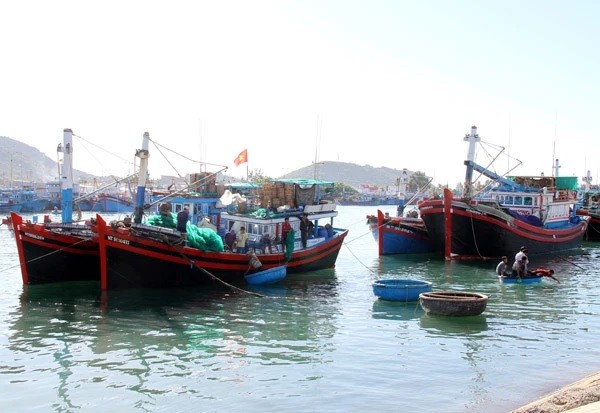
Determination and effort to resolve the 'yellow card' IUU issue
Latest
 |
| Fishing boats moored at Ninh Chữ port, Ninh Hai district, Ninh Thuan province. (Photo: VNA) |
The positive changes achieved by Vietnam are the result of determination and effort in both legislative construction and practical implementation since October 2017 - immediately after the European Commission (EC) issued a 'yellow card' warning.
In fact, these improvements have been acknowledged by the EC through four previous inspections. The urgency and determination to perfect institutional mechanisms are increasingly evident, preparing for the fifth inspection - considered the final one with the hope of demonstrating Vietnam's improvements following each of the EC's recommendations.
Following the EC's recommendations, Vietnam has made efforts to perfect its legal framework by enacting, amending, and supplementing the 2017 Fisheries Law and many other related decrees and circulars. Most recently, Directive No. 32-CT/TW dated April 10, 2024, from the Politburo on strengthening Party leadership over IUU combating and sustainable development of the fisheries sector.
Additionally, Vietnam has increased penalties and intensified the punishment of cases involving IUU fishing violations. As of May 21, Vietnam had equipped 98.25% of fishing vessels over 15 meters with the Vessel Monitoring System (VMS) and is swiftly moving towards 100% compliance. EC recommendations regarding the control of imported fishery products under the Port State Measures Agreement (PSMA), the reduction in the number of fishing vessels, and the intensity of exploitation have all seen better improvements.
In coastal localities across the country, thanks to proactive inspections, reviews of "three-no" boats (no registration, no inspection, no permit), and organizing for their registration, inspection, and granting of fishing permits under regulated conditions; intensive patrolling and control periods... the number of registered and inspected boats, and those equipped with communication devices has rapidly increased.
Vietnam's efforts are highly regarded by many researchers. Scholar Veeramalla Anjaiah, a senior researcher at the Center for Southeast Asian Studies (CSEAS), noted that Vietnam's ministries and localities have implemented numerous solutions to create clear changes in the fight against IUU fishing. The EC's recommendations have been incorporated into the Fisheries Law, but law enforcement has revealed some challenges due to limited human resources and insufficient coordination among localities.
From another perspective, expert Christian Vidal-León, a former dispute resolution lawyer at the Legal Affairs Division and the Secretariat of the WTO Appellate Body, stated that since 2017, Vietnam has made appropriate efforts to prevent IUU activities and has been actively negotiating and discussing to promptly remove the EC's 'yellow card' warning.
The EC postponed its fifth IUU assessment trip to Vietnam, possibly to September or October. The EC likely wants to await the outcomes of implementing Decrees 37 and 38/ND-CP (issued in April 2024), regarding the handling of administrative violations in the fisheries sector, before making a final decision.
With the efforts of the entire political system, sectors, and levels over nearly seven years, Vietnam is confident that it has been moving in the right direction, as demonstrated by significant changes in combating IUU fishing for the sustainable development of the global fisheries sector, including Vietnam. More importantly, we have clearly recognized that the IUU 'Yellow Card' is not only a matter of the fisheries sector but also concerns the reputation of Vietnamese goods and the nation's standing on the international stage.













